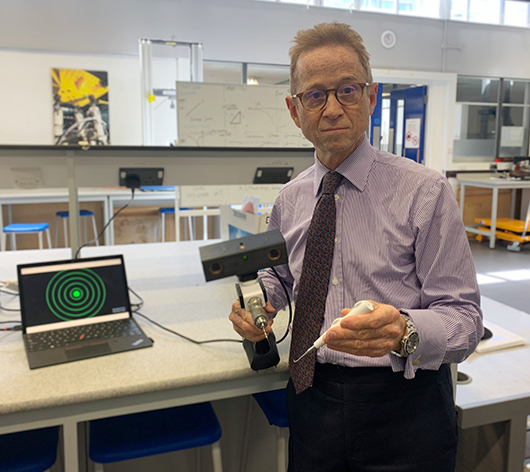Media Release
Date: 5 July 2022
RUH researches ground-breaking new drill guidance system
Researchers at the Royal United Hospitals Bath NHS Foundation Trust are conducting a study to test a ground-breaking new medical device – a drill guidance system (DGS) which aims to improve the accuracy of drilling screw holes into bones during surgery.

It is hoped that the drill guidance system, which has been developed in collaboration with the University of Bath, will help surgeons to be even more accurate when drilling the holes and reduce the time patients spend in the operating theatre.
Normally the surgeon will hold the drill and make the hole in the bones for the screws using just their eyesight, for procedures such as fixing a break in a bone.
In the trial, the surgeon will use all the same techniques but will have the addition of a camera on the drill and an indicator which will help them guide the drill in the correct direction as it passes through the bone.
The research team is collecting information on whether the new device reduces patient time in the operating theatre as it helps the surgeon to be more accurate, whether there are any complications after the operation and how successful the procedure was.
The research at the RUH is being led by Professor Grey Giddins, a Consultant Orthopaedic and Hand surgeon, with support from Dr Ioannis Georgilas, of the University of Bath’s Department of Mechanical Engineering.
Prof Giddins, who was recently made a Royal College of Surgeons of England Hunterian Professor for 2022 in recognition of his contribution to research in biomechanics of injuries in the wrist and hand, said: “It has been a privilege to work with the University of Bath and the research teams at the RUH in taking forward this research to help improve patient care.
“We are about to start the clinical trial which we hope will establish the value of this new device.
“This is a really exciting trial which we’re hopeful will have a really positive impact on our patients, potentially reducing the amount of time they spend in surgery.”
The RUH has an excellent reputation for participating in national and worldwide research, with a portfolio of nearly 200 individual research studies that thousands of people take part in each year.
The Trust offers research opportunities to patients across our hospital, in areas including cancer care, maternity, stroke, rheumatology, ageing and many more.
Most recently, the RUH’s research played a leading role in the fight back against COVID-19. The life-saving vaccines, treatments and tests that turned the tide against the pandemic have only been possible thanks to the people who volunteered to be part of research at the RUH and other hospitals up and down the country.
Dr Kelly Spencer, Head of Research Operations, said: “I would like to say a huge thank you to everyone who has helped with research studies here at the RUH.
“By volunteering to take part in a study you are playing a vital role in helping to treat and prevent disease both now and in the future.”
ENDS

